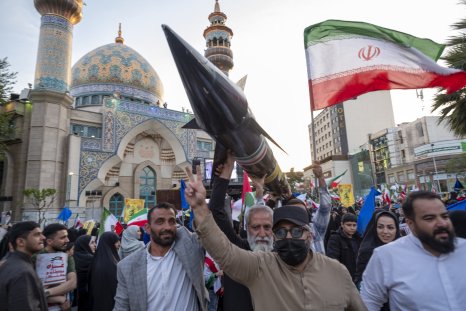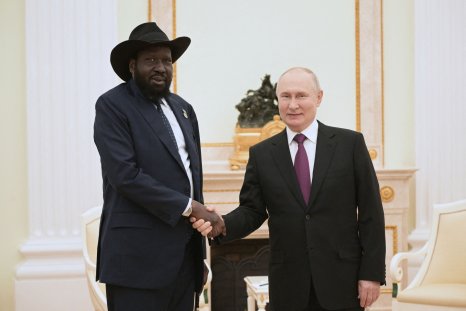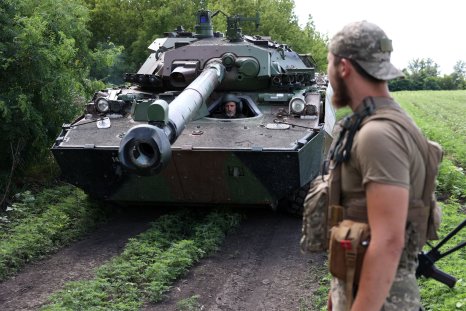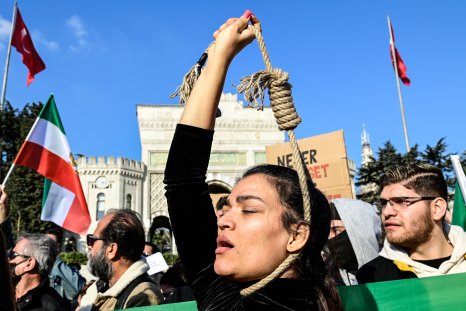The U.S. Needs to Rethink Its Whole Approach to Iran
Iran's attack on Israel was not a surprise, nor did it inflict significant damage. It was nonetheless a paradigm shift.
On Democracy, We Should Practice at Home What We Preach Abroad
In places like Saudi Arabia, the Soviet Union, Syria, and Eastern Europe we promoted democracy, freedom of conscience, and legal reform.
Saudi 'Sportswashing' Is More Than Skin Deep
They are concerned about the status of women in the kingdom, but two sports icons are stuck with a vision of a Saudi Arabia that no longer exists.
How Russia Won the Sanctions War With the West
It is now abundantly clear that Russia has defeated the Western sanctions regime that was intended to cripple its economy and force its withdrawal from Ukraine.
Why We Keep Getting It Wrong With Russia
Why do we want to damage Russia? Russia is not the Soviet Union: geographically, ideologically, economically, or militarily.
Ukraine Sure Doesn't Look Like a Democracy Anymore
In March 2022 the Ukrainian Security Council suspended 11 political parties that were considered pro-Russian.
While the World's Eyes Are Elsewhere, Russia Makes Gains in Africa
African leaders currently out of favor in Washington are being serially seduced by Moscow with arms sales, mercenary muscle, and political support.
Why Hamas Is a Direct Threat to U.S. Interests
As the dominos begin to fall, their impact on major regional players like Jordan, Egypt, and Saudi Arabia will be dramatic.
Europe's Leaders Are Paying a High Price at Home for Supporting Ukraine
Economic problems caused by the war in Ukraine have had very substantial political consequences. Over the past 18 months, more than a third of European Union governments have fallen.
Nobody Is Entitled to Their Own Facts on Ukraine
Our opinions regarding Ukraine are based on a dozen easily verifiable facts about that conflict.
For Ukraine to Win, NATO Would Have to Join the Fight
As the permanent partition of Ukraine becomes ever more likely, the question before us becomes whether NATO will go to war with Russia to prevent that outcome.
Saudi Arabia's True Role in 9/11
Saudis never made up the majority of al-Qaeda's leadership or membership. Below Osama bin Ladin, al-Qaeda's leadership was primarily Egyptian.
Saudi Arabia and the U.S. Are More Than Just Oil and Water
For more than two years, the United States has had no ambassador in Saudi Arabia. During that hiatus, a once robust and cooperative Saudi-American relationship withered.
Time Is Running Out for a Negotiated Settlement in Ukraine
Right now, what the Ukrainian people need is peace, security, and economic reconstruction.
After Bakhmut: Draining Battle Leaves Ukraine Battered, Russia Rising
There is nothing patriotic about an American flying a Ukrainian flag. Nor is there anything treasonous about an American questioning unlimited support for a foreign nation in a foreign war.
The West's Propaganda Machine Has Overplayed Its Hand in Ukraine
If you were looking for proof that some of our own politicians and pundits are pushing us ever closer towards a war with Russia, you found it last week when the destruction of an American drone and an arrest warrant issued for Russia's president were both presented as irrefutable grounds for increasing military assistance to Ukraine.
China's Role in Saudi-Iran Deal Shows U.S. Hegemony Is No More
Iran and Saudi Arabia have agreed to reopen their respective embassies. This news is neither unusual nor surprising as even hostile neighbors normally maintain diplomatic relations. The United States was aware of and did not object to these discussions, but it was China that brought them to a conclusion.
Ukraine's Famed Unity Is a Myth
Like the earth's surface, nations can be split by fault lines that lead to earthquakes. Once-unified nations like Czechoslovakia, and Yugoslavia have dissolved along their political fault lines. Ukraine is yet another nation sharply divided by religious, linguistic, and political fissures.
Never Forget the Real Reason Russia Went to War
Public support for NATO's proxy war in Ukraine rests upon three frequently repeated assumptions: Russia's invasion was unexpected and unprovoked, Ukraine is a unified, democratic state, and Ukraine will win the war. Based on widely available public information, it is increasingly self-evident that all three of these assumptions are flawed.
The U.S. Dollar's Supremacy Won't End Anytime Soon
Oil has been priced in dollars and sold on a global market for decades. Following Russia's invasion of Ukraine, the United States effectively stopped the use of the dollar in Russian oil sales and partitioned the oil market.
Practical Steps to Help Along Iran's Next Revolution
Iran has been shaken by repeated bouts of popular unrest ever since its Islamic Revolution overthrew Shah Reza Pahlavi in 1979. Unfortunately, none of its periodic outbursts of instability have led to permanent political change in Iran. Fortified by its cohesive clerical elite and the coercive muscle of the Islamic Revolutionary Guard Corps, the regime has been able to repeatedly suppress its disorganized opposition. Could this time be any different?
Blasphemy No Longer: Celebrating Christmas in Saudi Arabia
This past Christmas in Riyadh was unrecognizable to anyone who knew the city five years ago. Hitherto, openly celebrating non-Muslim holidays had been regarded as blasphemy.
Lessons From the U.S. Civil War Show Why Ukraine Can't Win
During the early years of America's Civil War, President Abraham Lincoln sought a limited conflict against people he still regarded as fellow countrymen and with whom he sought reconciliation. Only after three years of stalemate did he turn to "Unconditional Surrender Grant," who in turn unleashed General William Tecumseh Sherman to "make Georgia howl" and help bring the war to its decisively violent conclusion.
A Report on China's Opium War Against the United States | Opinion
The economic and territorial concessions wrung from the humiliated Chinese emperor were not forgotten. Now, taking a page from Britain's playbook, China has turned the tables and is fostering an opioid epidemic in the United States.
Edging Closer to Armageddon
Last month, President Joe Biden warned that mankind was closer to nuclear Armageddon than at any time since the Cuban Missile Crisis. We should take him seriously.
Why Now Is the Time for Russia and Ukraine to Talk
The withdrawal of Russian forces, Ukrainian neutrality, an end to economic sanctions and most importantly a cease fire and legitimate U.N.-monitored plebiscite are all negotiable, though you would hardly know it from the rhetoric of Russia or the West.
Who Lost Saudi Arabia?
In 2022, numerous senior American and European officials asked the Saudis to help blunt the oil price rise following the Russian invasion of Ukraine. This time the Saudis said no. What changed? As with most historical processes, the altered relationship between Saudi Arabia, the West has numerous causes.
Saudi Prince MBS Edges Closer to the Throne and That's a Good Thing
Last week's promotion of Crown Prince Mohammad bin Salman to the role of prime minister makes it more likely that this track record of stable succession will continue.
Nearly 90 Percent of the World Isn't Following Us on Ukraine
Our familiar system of global political and economic alliances is shifting, and nothing has made this change clearer than the varied reactions to Russia's invasion of Ukraine.
Why the U.S. Can't Count on Europe in Fighting Russia
The United States needs an economically strong, politically aligned, and socially united Europe. Instead, we now face both a divergence of interests with our European allies and a divergence of interests among the Europeans themselves.































